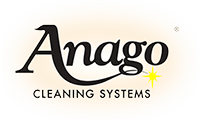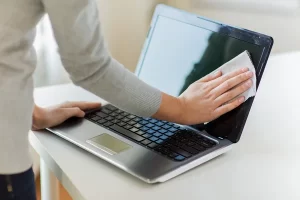Everyone has been there. One minute you’re getting a work project done, staying up late to work on a school presentation, or unwinding with some PC gaming, and then you see it…the unpleasant view of streaks, fingerprints, and dust on your computer screen.
If you let the accumulation of dust build up, it may affect how your monitor operates. You may soon notice a change in colour or brightness of the screen, disrupting your daily computer use. You may not even notice your screen is filthy until you see it on a black screen.
It’s a good idea to regularly clean your computer to keep it sanitary. However, cleaning a screen requires a delicate touch and the right cleaning solution. Using the wrong cleaner could potentially damage your monitor or laptop. You need to be careful during the cleaning process.
Here’s a guide on how to properly clean a computer screen:
What To Know
Not every computer screen is made from the same materials and requires different cleaning methods. Most monitors will come with two kinds of displays:
- LCD/LED Screens: Most touchscreens and Windows computers will not be glass-coated. You need to be gentle with these monitors to ensure you don’t damage the pixels.
- Glass-Coated Screens: Newer iMacs and MacBooks have glass screens and are less delicate than an LCD/LED screen. Use mild cleaning solutions, such as rubbing alcohol to gently wipe them down.
What You Need
When cleaning computer screens, there are some essentials you may want to have ready:
- Microfiber cloths
- Distilled water
- Disinfecting wipes
- Rubbing alcohol
- Distilled white vinegar (optional)
Cleaning LCD Screens
The first step in cleaning any computer is to disconnect the power cable. Never spray the cleaning agent directly on a monitor. Spray a small amount of LCD cleaner on a dry cloth and carefully wipe the screen in a circular motion. This should wipe away dirt, dust, and streaks from the LCD screen.
While it’s integral to add ample pressure to the screen, you’ll want to ensure you aren’t too forceful. The last thing you need is to damage the screen. If you’ve finished wiping and dust or streaks remain, you can always go for a second round.
Things To Avoid
Your screen is delicate. You need to consider what to use when cleaning it. If you aren’t cleaning it properly or gently, you can cause permanent damage. You may feel the temptation to use an old t-shirt or household rags. Don’t do it.
Avoid using aerosols or sprays, and don’t use too much cleaning solution as it can damage your screen and its internal components. Stay away from window cleaners. It’s a common misconception that they can be used for an LCD screen, but they do more harm than good.
Lastly, if you’re working hard to wipe away stubborn spots that just don’t seem to go away, do not use your fingernails or other items to scratch them off. You might end up with a computer screen full of scratch marks.
Cleaning Computer Monitors
There are alternatives you can use when cleaning your monitor. Lint-free cloths and paper towels will suffice, but microfiber cloths work best. Typically, newly purchased computers will come with a microfiber cloth for you to use.
If the dirt and grime need something significantly stronger, you can combine warm distilled water with a few drops of dish soap in a bowl. It’s pivotal that you make sure the mixture is diluted. Take a dry cloth and wipe the dust/dirt off the screen. You can use another dry microfiber cloth, dip it into the mixture, and gently wipe the screen. Make sure you don’t use too much excess liquid.
When using household cleaners, check to ensure there isn’t alcohol or acetone in them, which can remove the protective layer on your computer screen. You can purchase cleaning wipes made with a specific cleaner that is safe to use on monitors.
Cleaning Laptops
You can use cleaning wipes or microfiber cloths with white vinegar and distilled water to clean off your laptop screen. While tackling the accumulation of fingerprints, dust, and germs, you can clean out the debris stuck between the laptop keys. It’s best to ensure that you use a cotton swab when cleaning the crevices around the keys.
White vinegar is a natural deodorizer that can rid the laptop of any bad smells from dirt, grime, and oils from your hands. A can of compressed air is another effective method to get rid of the loose debris surrounding your keys.
Are you looking for the help of experienced commercial cleaning services? At Anago Cleaning Systems, we will guarantee absolute satisfaction when it comes to your commercial spaces. Whether it’s an office building, auto dealership, hospital, or something else, our franchisees can disinfect, protect, and maintain the environment and equipment of your workplace and business.

